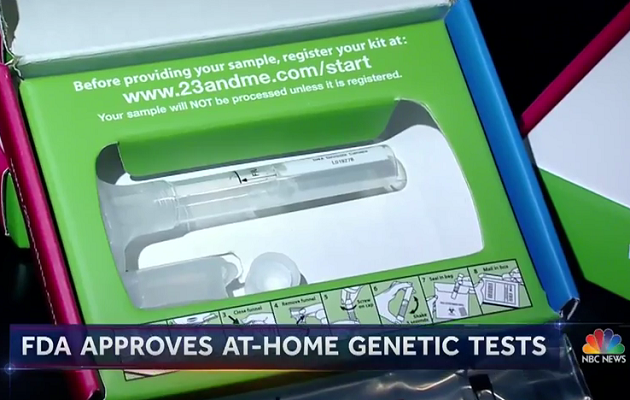FDA Approves At-Home DNA Tests For Ten Diseases
“it is important that people understand that genetic risk is just one piece of the bigger puzzle”

The FDA has approved 23andMe’s at-home DNA tests for ten diseases. There are concerns about the accuracy of such tests and privacy concerns over the results and the actual DNA samples.
The Food and Drug Administration approved the first home DNA tests Thursday that let people find out if they have a genetic risk for certain diseases.
The FDA decision allows home DNA test company 23andMe to directly market its gene tests for 10 diseases, including Parkinson’s, Alzheimer’s and some rare blood diseases.
“These are the first direct-to-consumer (DTC) tests authorized by the FDA that provide information on an individual’s genetic predisposition to certain medical diseases or conditions, which may help to make decisions about lifestyle choices or to inform discussions with a health care professional,” the FDA said in a statement.
“Consumers can now have direct access to certain genetic risk information,” said Dr. Jeffrey Shuren, director of the FDA’s Center for Devices and Radiological Health, which approves these kinds of tests.
“But it is important that people understand that genetic risk is just one piece of the bigger puzzle. It does not mean they will or won’t ultimately develop a disease.”
The FDA also requires customers to acknowledge that the results could cause them anxiety.
The FDA says these are all serious conditions and customers must first click an acknowledgement that they understand the results could cause them anxiety, a spokeswoman said. “The ‘opt-in’ page includes links to recommendations from professional medical associations on the benefits and risks of genetic testing for users to read before deciding whether to receive test results,” the FDA spokeswoman, Tara Goodin, said via email.
The ten diseases these at-home DNA tests screen for are:
- Parkinson’s disease
- Late-onset Alzheimer’s disease
- Celiac disease, which causes the inability to digest gluten.
- Alpha-1 antitrypsin deficiency, a disorder that raises the risk of lung and liver disease. More than 100 different genetic variations of the gene have been identified and only some are linked with deficiency.
- Early-onset primary dystonia, a movement disorder involving involuntary muscle contractions and other uncontrolled movements.
- Factor XI deficiency, a blood clotting disorder caused by certain mutations in a gene called F11.
- Gaucher disease type 1, an organ and tissue disorder caused by mutations in the GBA gene.
- Glucose-6-Phosphate Dehydrogenase deficiency, also known as G6PD, a red blood cell condition.
- Hereditary hemochromatosis, an iron overload disorder caused by mutations in at least five different genes.
- Hereditary thrombophilia, a blood clot disorder.
Watch the report:
There are concerns about the accuracy of such testing and about the privacy of the persons sending in DNA samples.
NBC News continues:
New York University bioethicist Art Caplan says he is surprised the FDA approved the home tests, given the questions that still surround even genetic tests done by physicians.
“So much remains unknown, both about the accuracy of testing and the ability of consumers to process genetic information without counseling or help,” Caplan said.
“Even physicians have a difficult time knowing how to interpret genetic test risk information. So this decision may wind up frightening as many people about genetic risk as it does empower them.”
. . . . Caplan says it’s also not clear what privacy people have and how well 23andMe could safeguard their test results, or even their actual samples.
 DONATE
DONATE
Donations tax deductible
to the full extent allowed by law.







